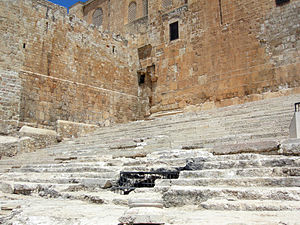 Image via Wikipedia
Image via WikipediaLeviticus simply states that when man sins, intentionally or not, he must be reconciled to God. Over and over, God reiterates that once a person realizes that he has sinned against God or against another person, he must seek reconciliation. Ideally, God did not provide for anyone in Israel
There is no discussion in the Bible about whether or not someone even wants to be reconciled – rather, it seems to be a mandate. Of course you want to be in good standing with God, the Creator of the Heavens and the Earth; with God, Omniscient and Omnipotent; with God, Sovereign over the universe; with God, the eternal I AM that I AM. הָיָה (hayah)
So what is so bad about sin? What is sin anyway? In our post-modern world, most people would decline to dignify this question with an answer. Today, sin has neither relevance nor meaning. Our culture urges people to do what feels good as long as it doesn’t hurt anyone or as long as it doesn’t violate laws of the land. The idea of good or bad is relative to each individual and absolutes are not countenanced.
However, in the Biblical context, sin has a very real meaning. In Leviticus, sin is the Hebrew word חָטָא (chata') which means to miss the mark, to lose oneself, to wander from the way, to incur guilt. When God gave laws to Israel Israel
Because God’s love for Israel Israel
As God was developing the character of Israel Jerusalem
Blue Letter Bible. "Dictionary and Word Search for hava' (Strong's 1933)". Blue Letter Bible. 1996-2010. 27 Aug 2010. < http:// www.blueletterbible.org/lang/lexicon/Lexicon.cfm?
Strongs=H1933&t=KJV >
Strongs=H1933&t=KJV >
Blue Letter Bible. "Dictionary and Word Search for chatta'ath (Strong's 2403)". Blue Letter Bible. 1996-2010. 27 Aug 2010. < http:// www.blueletterbible.org/lang/lexicon/lexicon.cfm?
Strongs=H2403&t=KJV >
Strongs=H2403&t=KJV >
Blue Letter Bible. "Dictionary and Word Search for kaphar (Strong's 3722)". Blue Letter Bible. 1996-2010. 27 Aug 2010. < http:// www.blueletterbible.org/lang/lexicon/lexicon.cfm?
Strongs=H3722&t=KJV >
Strongs=H3722&t=KJV >

Hey Oceankitkat! Thank you for stopping by my blog. I'm glad you enjoy Joyce Meyer. I like the way she brings God Word to a practical and personal level.
ReplyDeleteI am so glad that we don't have to atone for our sins the way they did in Old Testament times. I can't help but feel kind of sorry for them because even after they sacrificed all those animals and went through the sacrificial ritual, their sins were not completely forgiven. They were just pushed back a year, so they had to keep atoning for them every year. Believe it or not, I used to cry and hurt when I thought about what God did for us. I literally felt guilty, that He thought we are so bad that no animal was a "strong" enough sacrifice. That He, himself was the only one pure and good enough to save us from ourselves. I say "ourselves" because it is our own choice to sin or not to sin. Of course, I have grown up in Christ a lot since then and realized that His sacrifice is not something to feel guilty about, it is something we all need to treasure with our whole being, heart, mind and soul. (Although I catch myself reflecting on those early thoughts when I hear the song "Feel the Nails". I'm not sure if that is the correct title, but it is by Ray Boltz. A Gorgeous song that gets down to the core of a person's heart. It says "Can you still feel the nails every time I fail. Do you hear the crowd cry crucify again?" Now, every time I do something that God would be disappointed in me, the Holy Ghost puts that song in my head. I'm sorry for going on and on, but this is such a deep and meaningful subject to me. I want to scream out to people wake up! Your salvation depends on you "living for God, and having a relationship with Him". So many people think that just because they went to church and said, "I believe Jesus is my Savior" that that's all there is to it! I mourn for and have a "burden" for those people, to turn on the light, wake up and see what God wants from them.
Anyway, I better stop. I can go on and on. Come see me again.
God Bless,
PJ
Hey PJ - Amen to that!
ReplyDelete